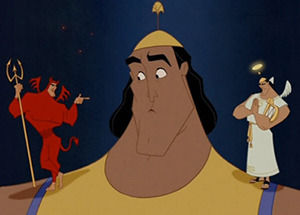Steven Lyle Jordan's Blog, page 57
September 14, 2013
What you want vs. what readers want
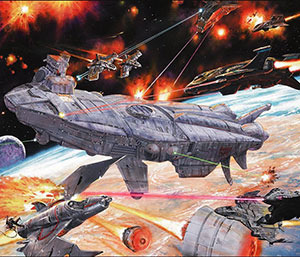
If this is what audiences want… why not give it to ‘em?
In my present attempt to find any promotional opportunities I’ve yet to pursue, one of the things I find myself returning to often is whether my initial failure was in writing books based on the science fiction I loved and wanted to read, as opposed to writing the sci-fi my potential audience wants to read.
“Give ‘em what they want” is a regular mantra in entertainment, and most of the best entertainers seem to be great at giving the audience what they demand. Certainly movie blockbusters are based on this simple formula: If audiences want fast cars, sexy bodies, big explosions, loud rock music and incredibly simple plots, let’s stuff those things into a 2-hour movie and watch the greenbacks roll in. So far (though this movie season has demonstrated that even this formula may be running thin), the method has been successful for them. Other media have proven similarly successful at the formula, for instance, books based on familiar characters like Harry Potter, Jack Ryan, Bella Swan or Lisbeth Salander.
Many aspiring and independent writers have caught on to the formula, and have written series featuring recurring characters, because their readers want more stories with those characters. I’ve done it myself with the Kestral series, and it has been one of my most successful sets of books. But by the time I wrote the third book, and contemplated a fourth, I’d had to ask myself: Am I writing these stories because I want to… or because readers want me to? And why is that difference significant?
The same has to be explored about formula and genre. I like futurist fiction, based on real technological advancements and realistic extrapolations of where they will take us; and intelligent characters trying to deal with those extrapolations as they live their very real and understandable lives. But is that what my potential audience really wants? Do they want realistic robotics… or time-traveling liquid-metal terminators? Do they want romantic glances… or skin and sex? Do they want orbiting factories… or trans-light starships? Do they want characters struggling in relate-able, real-world situations… or in melodramatic epics? Do they want intelligent characters… or characters that punch and shoot their way through problems?
Since there are many more examples of the seriously successful stories featuring terminators, starships, epic melodrama, punching and shooting, it seems the answer to the above questions are pretty obvious. So the next question must be: If what I want is to sell books, should I write those things? Should I give the readers exactly what they want? Or should I write what I want?
Most creators would like to think of themselves as artists, and as such, they demand the right to create what they want to create. But the world is full of artists who create things that, it turns out, no one else wants. Some of them will languish, undiscovered or unwanted, their gifts never entertaining the world. Others will realize they must create more popular objects, to “pay the bills” and to hopefully introduce people to their more heartfelt creations. And some creators simply give up the heartfelt stuff, and move exclusively to the popular creations that make them money.
And is this wrong? I suppose you could argue that commercial work is not as fulfilling to the artist as art work. On the other hand, there’s something to be said for creating something that pays for its effort; and the last time I checked, few debtors were willing to give artists a pass on their bills just because they’re artists. (I know I don’t have any debtors like that.) Ultimately, it’s up to the artist to decide if payment for commercial work is better than nothing for art work.
Personally, I’ve never considered myself an artist. As I’ve said before, I am a craftsman: I apply a learned skill to creating entertaining stories, with the express purpose of selling them. I want the money. I’m trying to pay for retirement, when—or if—ever it may come. And if my express purpose is to sell, it would seem my imperative should be to write stories in the formula that the public demands, whatever that formula is.
But so far, I haven’t done that. I’ve written the science fiction that I believe is strong, relevant and still entertaining, especially to people whom I imagine are much like myself. I’ve followed a formula that I appreciate, despite the fact that the majority of SF-loving people apparently want a different formula. Everyone’s asking for Coke, and I’m trying to sell iced Herba Mate tea.
So maybe it really is time for me to give ‘em Coke.
Can I do that? Well, every time I’ve tried to put together something more popular in theme and elements, my internal compass has steered me away and into a different, more serious direction. Part of my drive to write is based on my enthusiasm for the subject, and if I don’t have that enthusiasm, I suspect it might show in the final work. But, put simply, I’ve never actually tried it yet. And, I suppose, if I want to attract the attention of audiences, I must try to create a popular work for them.
I now have to weigh this against my original intention to forgo any writing projects until I can figure out how to promote the other books; the possibility that a successful book in a popular subject will somehow sell with my current (read: pathetic) promotional tools, versus the possibility that this book, too, will be largely undiscovered like the rest of my catalog. It’ll be a tough sell… especially to me. Because, before any other consideration, I have to decide whether this is something I want.


September 4, 2013
Desperately seeking futurist SF writers
 Being an independent self-published author, I’ve always sought to find other independent authors to enjoy… supporting the fraternity, as it were. But from the very beginning, I’ve had a problem: I can’t find indie authors, like myself, writing the kind of SF novels that I write and enjoy. There must be some; I can’t be the only futurist SF writer, or the last futurist writer who’s still independent or self-published. Where are all my futurist SF writing homeys?
Being an independent self-published author, I’ve always sought to find other independent authors to enjoy… supporting the fraternity, as it were. But from the very beginning, I’ve had a problem: I can’t find indie authors, like myself, writing the kind of SF novels that I write and enjoy. There must be some; I can’t be the only futurist SF writer, or the last futurist writer who’s still independent or self-published. Where are all my futurist SF writing homeys?
My writing is primarily a futurist’s type of fiction, taking a serious examination of where science and technology are taking us, or how it will impact us in the near and far future. Robots interacting with people… orbital habitats… the deepening environmental crisis… virtual reality and its impact on real life… making a living in a space-borne future… these are the kind of things I write, and the kind of subjects that interest me. And these are the kind of stories I seek out to read.
But it seems that when I search for independent self-published SF writers, what I almost always find are variations on Star Wars or Honor Harrington, those great sweeping war epics with evil aliens, massive battle armadas and planet-busting threats. A few books tend to be very John Carter, swashbuckling action with weird creatures and half-naked ladies abundant. Some are all Dune, overly-byzantine international politics masquerading as galactic politics, and stories centering around the Chosen One. And some are the vaguely-veiled Lady Chatterly In Space (or the even less-veiled 50 Shades In Space). And now, the latest thing in SF, alternate history and Steampunk, blending inventors, robots, antique-based technology, and, for some reason, zombies, into a strange mishmash of tarnished tropes designed to recall a Victorian ideal that never really existed.
Now, I’m not saying those story types are bad or anything; they’re just memes that I don’t get into. I like stories with more relate-able characters and more realistic situations, technology that may actually exist someday, and problems to be solved that aren’t too far from the problems we face today.
Books like Nathan Lowell’s Solar Clipper series, where a young man learns to make his way in freighting. Books like Jeff Garrity’s Mars Girl, a look at the future of mass-media framed around a Mars mission disaster. I want more of those kind of books. And sure, with some humor, some romance and sex, some melodrama… those always spice up a good meal. But I want to find them by indie self-publishers, not just the major publishers’ stuff. I know what the food is like at The Outback. I want to find the Fred’s Steak Houses that are cooking up their own phenomenal fare.
I wish someone would help me find them. Because, frankly, available search engines do a lousy job of it. Sure, they can find SF, but they don’t seem to be able to be able to differentiate between star wars, swashbuckling fantasy and serious SF. And they lean heavily towards the Outbacks, hiding all the Fred’s behind paid ad banners.So, help me out here. If you know the best way to search for these books, give a guy a clue. Point me to any authors you know of. Help a guy find a good book to read!


Where my futurist SF writing homeys at?
 Being an independent self-published author, I’ve always sought to find other independent authors to enjoy… supporting the fraternity, as it were. But from the very beginning, I’ve had a problem: I can’t find indie authors, like myself, writing the kind of SF novels that I write and enjoy. There must be some; I can’t be the only futurist SF writer, or the last futurist writer who’s still independent or self-published. Where are all my futurist SF writing homeys?
Being an independent self-published author, I’ve always sought to find other independent authors to enjoy… supporting the fraternity, as it were. But from the very beginning, I’ve had a problem: I can’t find indie authors, like myself, writing the kind of SF novels that I write and enjoy. There must be some; I can’t be the only futurist SF writer, or the last futurist writer who’s still independent or self-published. Where are all my futurist SF writing homeys?
My writing is primarily a futurist’s type of fiction, taking a serious examination of where science and technology are taking us, or how it will impact us in the near and far future. Robots interacting with people… orbital habitats… the deepening environmental crisis… virtual reality and its impact on real life… making a living in a space-borne future… these are the kind of things I write, and the kind of subjects that interest me. And these are the kind of stories I seek out to read.
But it seems that when I search for independent self-published SF writers, what I almost always find are variations on Star Wars or Honor Harrington, those great sweeping war epics with evil aliens, massive battle armadas and planet-busting threats. A few books tend to be very John Carter, swashbuckling action with weird creatures and half-naked ladies abundant. Some are all Dune, overly-byzantine international politics masquerading as galactic politics, and stories centering around the Chosen One. And some are the vaguely-veiled Lady Chatterly In Space (or the even less-veiled 50 Shades In Space). And now, the latest thing in SF, alternate history and Steampunk, blending inventors, robots, antique-based technology, and, for some reason, zombies, into a strange mishmash of tarnished tropes designed to recall a Victorian ideal that never really existed.
Now, I’m not saying those story types are bad or anything; they’re just memes that I don’t get into. I like stories with more relate-able characters and more realistic situations, technology that may actually exist someday, and problems to be solved that aren’t too far from the problems we face today.
Books like Nathan Lowell’s Solar Clipper series, where a young man learns to make his way in freighting. Books like Jeff Garrity’s Mars Girl, a look at the future of mass-media framed around a Mars mission disaster. I want more of those kind of books. And sure, with some humor, some romance and sex, some melodrama… those always spice up a good meal. But I want to find them by indie self-publishers, not just the major publishers’ stuff. I know what the food is like at The Outback. I want to find the Fred’s Steak Houses that are cooking up their own phenomenal fare.
I wish someone would help me find them. Because, frankly, available search engines do a lousy job of it. Sure, they can find SF, but they don’t seem to be able to be able to differentiate between star wars, swashbuckling fantasy and serious SF. And they lean heavily towards the Outbacks, hiding all the Fred’s behind paid ad banners.So, help me out here. If you know the best way to search for these books, give a guy a clue. Point me to any authors you know of. Help a guy find a good book to read!


September 2, 2013
The man behind Man Plus. RIP Frederik Pohl.
 Frederik Pohl, the acclaimed science fiction author behind one of my favorite novels, Man Plus, passed away today.
Frederik Pohl, the acclaimed science fiction author behind one of my favorite novels, Man Plus, passed away today.
The list of novels he’s written, or edited, or presented in his magazine Galaxy, that I have not read, is too long to enumerate here. Pohl was the very definition of prolific in his writing and editing. Most importantly to me, his style and sensibilities helped to inspire me in many of my own writings.
Man Plus is a perfect example of this. In Man Plus, scientists planning the first manned mission to Mars decide that a human needs to be “augmented” to properly survive on the Martian surface, and thereby to ensure the success of the mission.
Astronaut Roger Torraway is selected to be the subject of the “Man Plus” project, and is turned into a Mars-customized cyborg. Before and during the mission, he must not only deal with his new body, but his connections to his wife, friends and colleagues, as well as his self-image and his definition of what it means to be human. The story highlights Roger’s struggle, as it portrays a Mars that feels incredibly real and even likely, along with a few twists that make the novel really shine (and inspired a sequel).
Pohl’s style was always about realism and relevance: His characters were more real than most I’ve read by many other science fiction authors, and his plots and settings were always believable and vivid. These were qualities that I valued highly in my SF, and featured in my own novels. Along with the works of Clarke, Crichton and Bova, Pohl was one of the most inspiring to me.
I had only recently rediscovered some of his novels that I’d not read in years past, or had read and forgotten in time. Surely the only good thing about Pohl’s passing is that it will inspire others to seek out his work, spreading his fame even further. We’ll miss you, Fred.


August 30, 2013
What’d ya do WRONG?
My decision to lay off novel-writing, since I could not work out the promotional end of selling the books, has led to a common (and predictable) reaction from many of my friends and relatives, to wit: Since I enjoy writing, I should keep writing anyway, just for my own satisfaction. The idea that creation is its own reward is ingrained in the thoughts of modern society, as well as the essentially honorable concept of the “starving artist.”
And though I, myself, bought into these ideas for years, I find that I can’t get behind them the way I used to. And it’s not because I get no satisfaction from creating; I do, in fact, enjoy the process of writing and creating a good story. But since giving up novel writing, I’ve found that I’ve had to cage up a tiny demon in the back of my head, one that has become a constant distraction to me. He’s not my creative demon. He’s my analytical demon. And he demands to know what I so thoroughly fucked up.
When I tried to sell books, I followed numerous pieces of advice from writers, readers, friends, strangers and internet denizens, all designed to spread the word about my books, price and market them attractively, and build my writer’s cache into a successful commercial force that would provide certain financial rewards (nothing monumental, you understand, but a respectable second income at least). To avoid rehashing the subject, I’ll just say it didn’t work, and I eventually decided to move on. But though I try to be outwardly at peace with my decision, I soon discovered that I had two voices inside me that are continually arguing about the whole episode.
One side of me—if they were tiny little creatures poised on my shoulders, I suppose he would be the one with the white robe, halo, wings and little harp tucked under one arm—likes to say: “Well, you did what everyone said would work, and to the best of your abilities, you did them well and honorably. If it didn’t work, it’s not your fault. Don’t knock yourself out over it.”
But the other side—the one in the red robe, tiny horns on his forehead and a pitchfork stuck up my ear—says: “Hey, if you did all that stuff that was supposed to work… and it didn’t… then you musta done somethin’ wrong! So: What’d ya do wrong, ya mook?”
The thing is, I can’t ignore him—he’s got a point. I mean, sure, maybe I failed through no fault of my own. But it’s probably more likely that I failed because I didn’t do something right. And as long as he’s there, reminding me of that, I find myself forced me to commit countless brain cells in trying to figure out what.
And unfortunately for me, that guy has a particularly irritating and strident voice. And he never, ever shuts up. I’ve literally had to lock him away in the back of my mind, in a tiny little cage with blankets thrown over it, to try to drown him out… and he still makes a constant racket, rattling the bars, poking at the floor, and yelling, “What’d ya do wrong?” And the other guy tries to soothe him with nice harp music, assuring him that it doesn’t matter, it’s water under the bridge… but he just gets cussed out or pelted with feces for his trouble.
My devil has become a distraction, to the extent that I can’t even entertain the thought of writing another novel for hearing him screaming at me from below, demanding to know where I screwed up… and importantly, why do I think I won’t screw up again if I don’t figure out what I did wrong all the other times?
So, to recap: I can’t write novels anymore, because of the screaming meanie in my head that won’t let me think straight. I’m kind of hoping that eventually, he’ll develop laryngitis, get too tired to hold up his pitchfork, and leave me alone. But the damage is done, because as long as he’s back there—screaming the question, whispering it hoarsely, or just plucking feebly at the bars—I’ll know that, sooner or later, I’ll have to answer that question. Only an answer will shut him up for good. And only an answer will give me the peace I need to write again.


August 23, 2013
Do movies get a logic pass… because they’re movies?

Elysium, courtesy Tri-Star Pictures.
I recently managed to get out to see Elysium in the theater. This much-hyped movie garnered high expectations, especially as images from the movie were released and it became clear how much beautiful work had gone into its production. However, once the movie premiered it became clear that the story itself hadn’t gotten as thorough a treatment as the sets and effects, creating a movie with innumerable logic inconsistencies and downright dumb plot points, clearly designed to get the hero from Predetermined Action Point A to Predetermined Action Point B, no matter how contrived that journey might be.
To be sure, Elysium is not the only movie guilty of these transgressions; they are quite common in action-adventure movies of every type. It’s as if a “logic pass” is being bestowed, an unofficial declaration that these momentary lapses in logic and sense are “unimportant” as long as they further the basic narrative (“basic” being defined here as hero fights and wins). But why are movies getting this “logic pass”?
Take this scene in Elysium, where the hero, Max, is confronted by law enforcement droids while waiting in line for a bus. The droids identify him as a parolee (he used to boost cars), and when they ask him what’s in the bag, Max replies: “Hair products.” (He’s bald.) He tries to add, “Hey, I’m just going to work—”, but apparently the droids have zero sense of humor, because they knock him down and bust his arm as they rifle through his bag.
You’d think an identified ex-con who probably had had plenty of experience with and around humorless (and powerful) law enforcement droids would know better than to mouth off at one, wouldn’t you? The scene is clearly intended to depict Max as being harried in life. Yet he’s harried because he’s a moron; and this is the guy we’re supposed to root for and expect to win the day. But that’s okay, because the scene got his arm busted, which moves him to the next scene, meeting his ex-girlfriend in a hospital. Here’s your logic pass.
I’m not going to go on listing logic pass moments in multiple movies… we’d be here for months, and I’m sure you can think of a few such moments on your own. My point is, in most other media such moments are not acceptable. In books especially, characters and actions don’t generally get logic passes; if they don’t make sense, the reader dumps the book, the critics highlight the “grievous error,” and the world marks the author as damaged goods. So why do movies get to hand out logic passes like novelty playing cards?
Movies are a particular form of storytelling, with rules and styles all their own… not even television uses all the same narrative or even visual forms as movies. Movies are unique because they are encapsulated into a brief period of time (anywhere between 1-1/2 and 3 hours, generally), and so much take certain shortcuts in order to frame a narrative or carry out an action. These shortcuts often take the form of an extended conversation or lengthy infodump being edited down to a sentence or two, possibly a character’s brief action, or even being cut altogether, in order to give precious time to the narrative elsewhere.
The problem is, many of today’s movies make no effort to create shortcuts that make narrative sense, instead providing a stoopid bridge from Point A to Point B, and hoping no one notices or cares. Studios, in the interest of making the biggest buck, have decided to trade logic for spectacle: Why have a logical story that results in a man escaping his captors, when a story can ignore the logic and result in the man getting ahold of heavy weaponry, shooting dozens of his captors, stopping to engage one with his Kung-Fu moves and simultaneously free the basement full of white slave captives before blowing up the entire building with mushroom cloud megatonnage? And apparently, they’re right: People still go to these movies, even after the logical fallacies are identified, acknowledged and discussed ad nauseam. In other words, logical fallacies don’t cause an action movie to lose any profit at the box office. So why bother?
Times are a-changin’; intelligent movies are increasingly being watched on television or the web, not so much in the megaplex theaters. Movie producers, understanding this, are leaning back onto the original point of Hollywood movies in the first place: To sell tickets, by any means possible. They are largely surrendering intelligent content to other mediums, and throwing all their eggs into the turned-up-to-11, logic-passes-fly-like-locusts super-spectacle basket. Unless the prognostication of Spielberg and Lucas come true, and the blockbuster movie format collapses (while somehow failing to collapse the theater industry along with it), I can’t see producers changing their tunes.
And what about the audiences… after all, we’re ultimately the ones who end up with these logic passes in our pockets, right alongside our fake-butter-stained ticket stubs. Why aren’t we saying anything to the producers? Why are we bitching and moaning the dearth of intelligence in movies… then turning around and buying tickets to Transformers 6-7/8?
Because, despite the wealth of media choices, movie-going is still part of our shared society and culture; try as we might, we really don’t want to give it up. We want them to get better, sure… but not enough to boycott them until they improve. We go, knowing we will most likely remember nothing about how we spent the past two hours other than the fact that we paid $9 for popcorn with fake butter, and wasn’t that building blowing up totally awesome? We’re blockbuster junkies, and as long as we’re willing to stick our hands deep into the beehive to get our fix, we can’t expect anything to change.
So, clearly there’s no point in decrying the motion picture logic pass; it will be with us for quite some time, because movies. If you don’t like it, go set up a home theater in your basement and queue up Lawrence of Arabia from your DVD collection.
Or watch Citizen Kane on your TV…
Or watch The Great Escape on your computer…
Or watch Gone With the Wind on your tablet…
Or watch The Great Race on your phone…
‘Cause it’s not like you have a choice in the matter. Really.


July 28, 2013
The drone impact
 Drone technology has been growing by leaps and bounds over the past decade, a unique convergence of kids’ toys and military-grade surveillance equipment that is inexorably reaching into other aspects of our lives, filling in the gaps between those extremes. And as it develops, we are already seeing signs that this could signify another quantum shift in the impact of technology in our everyday lives.
Drone technology has been growing by leaps and bounds over the past decade, a unique convergence of kids’ toys and military-grade surveillance equipment that is inexorably reaching into other aspects of our lives, filling in the gaps between those extremes. And as it develops, we are already seeing signs that this could signify another quantum shift in the impact of technology in our everyday lives.
Drones are radio-operated mobile devices, designed to go where people often cannot go, to provide a platform to gather information or to execute some task formerly done by people or larger technology (like piloted aircraft or submarines). It’s obvious why this technology was co-opted by military organizations as soon as it was practical, and it has already saved countless lives and (probably) billions of dollars in its use. The kids got things like radio-controlled helicopters, the ones you see teenage salespeople in shopping malls flying around the patrons’ heads, putting money in toymakers’ pockets. And all was fine and good… until someone who wasn’t in the military realized that some drones could be used for activities other than floating around the room or over your roof.
The realization that civilians were attaching cameras to over-the-counter drones (some come with their own video cameras) and experimenting to see what kind of mischief they could get into, struck most people with the impact of finding a camera in your bathroom. Simultaneously you had regular people crowing about the ability to cruise over the next door hot chick’s backyard to catch her sunbathing… and people decrying skies suddenly filled with cameras watching their backyards and bedroom windows, reporting back to who-knows-who. States have already had to pass laws forbidding civilians from shooting down drones that fly over their properties, and laws are being enacted or amended to restrict the places civilian drones are to go.
And though there’s no sign of it yet, there’s the possibility that commercial entities may put drones to use, watching potential customers or targeting ads to people on the street or in their neighborhood. Imagine a drone floating down over your cookout, observing how brown your grass is and recommending a few Scotts products to green up your lawn. Flying local billboards or remote audiocasts are not outside of the realm of possibility.
But drones serve a good purpose, and not just for the military: Security and law enforcement agencies can use drones to keep an eye on places where they can’t put people (or enough people). Police departments that can’t afford expensive tools like helicopters are now using drones for suspect surveillance and tracking, for crime scene overhead views and for search and rescue operations. Plainly, drones are useful and valuable pieces of technology that we should take every advantage of.
So we have a great tool in the right hands, that is also proving to be a nuisance at best, or a danger at worst, in the wrong hands. (If you don’t think a civilian drone is a danger, imagine one being clumsily piloted through a window, falling on an unknowing civilian—as I’ve seen happen in those shopping malls—or bouncing off of a car windshield in traffic… one of these mishaps was depicted in my novel Sarcology.) Civilians need security and protection… but from their fellow citizens as well as criminals.
This puts us in a similar situation as we found ourselves in when the Global Positioning System (GPS) was put in place by the military. Also a great tool that could be a danger in the wrong hands, the government was forced to unilaterally decide that GPS had to be regulated outside of military use; that it could be used, but hamstrung to limit the accuracy of a position reading for civilians. Though the act wasn’t popular among civilians, they quickly saw that it did not inconvenience them significantly, and it was still much better than nothing. Not that they could do anything about it, but civilians came to accept the law, and today very little is said about it.
We’re probably looking at similar laws regulating drone use in the U.S. at the civilian end. Tighter restrictions against drone-permissible areas and flight radii can be expected most immediately, followed by regulations on exactly what can be done with a civilian drone, and heavy fines established for violating those rules. Civilian-owned drones may have to adopt visual standards, such as paint schemes or flashing lights, to make sure they are plainly in view and identifiable as non-government devices. Drone owners may find themselves forbidden to fly a drone off of their own property, or drones may be preset with a distance limit which, when exceeded, will return the drone to its origin point. Recording equipment, cameras or other technology, may be tightly regulated, possibly licensed with local government right to inspect at will any device.
In addition to regulation, technology is already being deployed to monitor and track the drones. Recently a man using a drone to hover over a kids’ soccer game was rousted from his home by authorities, who tracked the drone signal back to his home. Building-mounted cameras and other surveillance equipment may aid law enforcement’s ability to detect a drone, determine if its use strays outside of the law, and locate and identify its owner before the drone has even had a chance to land.
At the lighter end, the existence of drones (or widespread belief that drones are out there) may result in a commercial resurgence in heavier window dressings: Camera-blocking curtains, shades, blinds and opaque films may all see a popularity spurt by those seeking to avoid drone-spying into their homes.
All of this may take some of the fun out of drone flight… but it will serve to allow individuals to enjoy some aspect of the drone technology that keeps us safe and secure, without having to shut it away from civilians altogether.


July 17, 2013
Video review: Star Tr… uh… Steamboy!
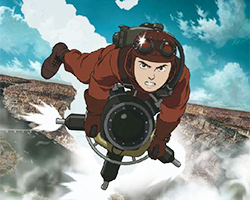
Steamboy, Sony Pictures.
Yes, due to the innumerable requests I’ve had to weigh in on the latest Star Trek movie, I’ve decided to… review Steamboy instead!
Steamboy: Creation of Katsuhiro Otomo, the incredible artist who brought us Akira! Steamboy, the animated feature-length film that took ten years for The Steamboy Committee (a conglomeration of production houses that cooperated on the film, much like the production arrangement for Akira) to produce.
Alas, Sony Pictures did not expect much of a reception by American audiences (must have been all those British accents… Americans apparently hate accents that aren’t attached to supermodels), and gave this a limited release… so don’t be surprised if you find yourself saying, “Steam-wha?” But having adored Akira, and being that I am currently exploring the realms of Steampunk fiction, I’m glad I finally had a chance to see this film.
Steamboy is set in a unique offshoot of the science fiction genre known as Steampunk, which features late-eighteenth-to-early-nineteenth century industrial age mechanics, powered by steam-based systems in some alternate universe where steam has been made as potent as dynamite, and engineers have proven capable of building anything, no matter how impossibly large. It’s an odd mix of the Industrial Revolution and Victorian morals and ideals with impossibly potent but simple technology and a complete disdain for the natural limitations of matter, a romantic before-physics-and-fossil-fuels-ruined-everything kind of notion. And right now, there seems to be one of those technological backlashes going on in the entertainment industry, resulting in a lot of magic, fantasy, and, well, this. What are you gonna do? You put on your aviator’s jacket and goggles and go with it!
Steamboy is the story of Ray Steam, third-generation genius inventor, whose father and grandfather have apparently co-invented an amazing steam-ball that uses a rare mineral water and finds ways to compress it beyond anyone’s wildest dreams. Ray is introduced to the device when his grandfather sends it to him under mysterious circumstances… and immediately finds himself pitted against powerful men who want that device and its incredible power potential for themselves. As the story progresses, it’s difficult for Ray to know who to trust, even as he discovers that most of the people who want his steam-ball are arms merchants, hoping to become global powers through its control.
A PG-rated story—mainly for violence, which is mostly comic-book harmless but does show a bit of blood—Steamboy is a boy’s adventure romp from beginning to end, with plenty of chase scenes, on-the-fly inventions and cool gadgets to help Ray out of each jam. Ray is portrayed as a smart and brave but otherwise typical kid; and he’s appropriately unsure what to do in many moments of the story, mainly due to his father and grandfather, who are apparently at odds with each other and testing Ray’s loyalties repeatedly. As is typical for most boy’s stories, just about every other grownup is essentially an enemy to be escaped or beaten with his juvenile wiles. Ray also has a potential love interest of sorts, a precocious spoiled brat with the unlikely name of Scarlett O’Hara St. Jones (they never refer to her as Scarlet O’Hara, so it took me a bit before I put the pieces together… oy), but rest assured, not even a kiss on the cheek is exchanged with these kids.
Steamboy uses a mixture of traditional and computer animation to take full advantage of the Steampunk genre. The colossal engines, victorian-era zepplins, cobbled-together garage inventions and hybrid machine-bastards are the eye-candy of Steampunk, and nowhere have have I seen them better presented than in this production. Every frame is gorgeous, the action is so beautifully rendered as to elicit oooohs and ahhhhs from those anime fans out there. I do find myself wishing animators put as much work into the main character’s faces and designs as they did their incredible machines and backgrounds… they tend to be the very basic of caricatures, as is unfortunately typical of anime. This complaint aside, it’s hard not to love the look of this production.
In many ways, the movie reminds you of Akira, with its massive scales, world-shattering technologies and themes that make individuals seem as insignificant as ants. And the ending of Steamboy is Akira-like in its constant escalation of technology-gone-wrong that impacts the very atmosphere around the juggernaut known as the Steam Castle, and threatens to destroy Manchester, the historic Crystal Palace (early symbol of the Industrial Era that inspires Steampunk), the Queen and, ultimately, the very British Empire. It is beautifully insane and over-the-top, leaving Ray Steam and Scarlett as about the only ones left standing when the smoke… er, steam clears.
In fact, as I watched the ending, I felt the same as I felt with the ending of Akira: A distinct feeling that the ending was being drawn out and escalated specifically so the animators could show off their artistic skills. You tend to get this impression from many animated features, for good reason. Animators like to show why their art is as good as live action, if not better, and animation fans love to see this stuff. But, just as I did with Akira‘s climax, I found myself wishing the Steamboy director of animation had stepped in and said, “okay, you’ve had your fun… now let’s just wrap it up here.”
Still, if you can forgive the animators’ over-zealous efforts at the end, you’ll find yourself exultant at how much fun Steampunk can be, in the right hands—the hands of the Japanese, apparently.


July 9, 2013
Characterizations: Try the casting approach
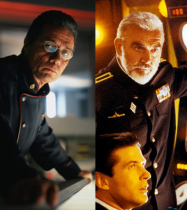 Do you sometimes have trouble finding and maintaining a different “voice” or mannerism for your various fictional novel characters? Have people accused your characters of sounding the same, beyond gross differences in their makeup? Authors can struggle with this, especially those new to creating fictional characters for a story.
Do you sometimes have trouble finding and maintaining a different “voice” or mannerism for your various fictional novel characters? Have people accused your characters of sounding the same, beyond gross differences in their makeup? Authors can struggle with this, especially those new to creating fictional characters for a story.
If you’d like a new way to manage this issue, try one of my favorite characterization tools: For each character, imagine a particular actor in a particular role as playing that character.
Like certain memory exercises, applying an actor to your characters is a good way of giving yourself a mental image of their character aspects, and how they would act or speak in particular situations. If you know what kind of character you plan to create, and a particular actor in a particular role epitomizes that character, they become an easy memory cue to how to approach the character.
As an example: You’ve created a hard-as-nails ship’s commander, and you want to nail down his mannerisms. Well, you certainly have a lot of commander characters to choose from in movies and TV shows, from tough, gruff Edward James Olmos in Battlestar Galactica, to by-the-book-to-a-fault Humphrey Bogart in The Caine Mutiny, to Sean Connery in The Hunt for Red October, and many more. As you write that character’s scenes, you will imagine the chosen actor in that scene, and how they would have played it… what words they would use, and how… and how they would act and react to certain moments.
The good thing about this method is that, unlike Hollywood, you’re not restricted to using an actor who looks the role you are creating. Your big, tough drill sergeant can be Drew Barrymore in Charlie’s Angels, your wise-talking waitress can be Danny De Vito in Taxi. Your Tooth Fairy can be Dwayne Johnson. (Okay, wait…) Whatever cements the character for you is fair game.
Now, to an extent, you’re building on some character stereotypes and familiar tropes when you do this… and you should discover that it doesn’t always work for every character, including your main characters (who have hopefully been pretty well developed already). To mitigate this problem, you can choose an actor, but not a particular role, and try to imagine how the actor would portray your role. As in, imagine yourself as the director, telling the actor what they need to do in this scene, then stepping away and watching them do it for you. Imagine the differences in how Jackie Chan or Lucy Liu would play an Asian businessperson in an American business negotiation gone wrong, or how Ian McShane or Denzel Washington would handle a father whose son just went missing.
And you can mix and match: Suppose you want the strong characteristics of a C.C.H. Pounder… but the looks of Angela Bassett? Or the neurotic humor of Woody Allen with the appearance of Wayne Brady? Why not? Go for it.
And don’t think you can only use obvious actors and roles… dig around. Pull a few out of the not-so-popular movies and programs that are among your personal favorites (makes it harder for readers to finger the actor you’re using). Try Bill Cosby from I Spy… Catherine Schell from The Return of the Pink Panther… Burgess Meredith from The Twilight Zone… Gabrielle Anwar from The Grave… Peter Falk from Robin and the Seven Hoods… and all those anonymous character actors and actresses in every B movie you’ve ever seen (hey, wasn’t that guy in an episode of The Beverly Hillbillies?). The list is endless.
It might help to add these to your character notes as you create them… maybe jot down two or three actors and roles, and narrow them down as you develop other characters, or as they are introduced in the story. Then run with those characters, and you’ll discover how easy it is to let them do their thing, and give your story the needed color and personality it craves.


July 6, 2013
Commitment
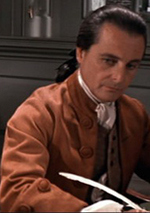 Though a DVD malfunction made my annual tradition a day late, I watched the movie 1776 on the day after the July 4th holiday, as my yearly reminder of the drama and against-all-odds brinkmanship involved in getting a group of headstrong pioneers to band together, against all expected chance of victory, to put aside their formidable differences and agree to stand up to one of the mightiest empires of the world, in the name of Freedom. Our nation today is a direct result of the miracle they pulled off back then, starting with their mutual commitment to the task at hand.
Though a DVD malfunction made my annual tradition a day late, I watched the movie 1776 on the day after the July 4th holiday, as my yearly reminder of the drama and against-all-odds brinkmanship involved in getting a group of headstrong pioneers to band together, against all expected chance of victory, to put aside their formidable differences and agree to stand up to one of the mightiest empires of the world, in the name of Freedom. Our nation today is a direct result of the miracle they pulled off back then, starting with their mutual commitment to the task at hand.
“Commitment” is the theme of the movie; and John Adams, the central figure of this drama, is Commitment’s strongest representative—dogged, resolute, unyielding, defiant, willing to risk his standing, his fortune, his popularity and, ultimately, his very life in the cause of fighting for Freedom. He is a real-life tragic hero, for, as many of us know, once the Declaration was signed and full-on war was declared against Britain, Adams and the rest of the Continental Congress were in most cases hunted like dogs, their homes destroyed, their families captured or killed, their fortunes lost, their health lost as they crawled under cover and darkness through damp marshes and brutal winters. Adams, who eventually became President himself, was one of the luckiest ones; many of those brave men didn’t live to see an independent United States of America, the cause that defined them and was demanded of them by posterity.
Watching 1776 brought a tear to my eye, more than once. Not just because of the drama of the moment; but because thinking about their trials and efforts just makes my own personal issues and efforts seem so pathetic in comparison.
“There are only two creatures of value on the face of the earth: those with the Commitment, and those who require the Commitment of others.” So said John Adams, one of his only direct quotes to be inserted into 1776. (I would love to think Adams had actually said, “I have come to the conclusion that one useless man is a Disgrace… that two useless men are called a Law Firm… and that three, or more, become a Congress!” But apparently that was written just for the play and movie. Sigh.)
Anyway, it’s Adams’ statement on Commitment that not only defines him so well, but shames me as thoroughly… for I must admit to having lost my commitment to novel writing. After having struggled for years against all odds of becoming successful, I finally admitted defeat at the hands of an uncaring market that refused to be swayed by my desires and efforts on their behalf; and after being shunned, belittled and ignored for so long, finally turned away from my quest and slunk away, tail between my legs. I gave up… I was broken, and with pathetically little effort applied to breaking me.
Had John Adams been alive today, I imagine he would have bitch-slapped me for showing so little backbone… though, I suppose, he might have also considered me beneath his notice, as my personal cause is obviously nothing in comparison to his fight… shaming me even further. And so I weep, not only in appreciation for the sacrifices Adams and others made, ultimately, on my unworthy behalf… but in full understanding of my unworthiness and weakness in the face of minimal adversity, my inability to stand up to the belittling and ignoring of my efforts to be an independent writer, and my lack of perseverance. I am pathetic. I am Kafka’s Gregor Samsa, the man who finally realizes that he is, in fact, a cockroach, worthy only of the scorn and disgust of others.
>Hahh.<
(Okay, I got that off my chest. Moving on.)
I’ve always been impressed by heroes, by those who fight adversity and resistance and come out on top… hey, that’s what heroes are for. But at the same time, I’ve been aware of those who simply will never have the chance to be a hero, and who understand their limitations. The world is full of people who fight the good fight, resist adversity, stand up for their rights and desires… and lose anyway. Despite what the Muppets would have you believe, Life is NOT a movie, and people’s endings are often written by someone else, whether they like it or not. Some of us strive for fame and fortune, and end up serving sandwiches. Some of us struggle for college degrees, and end up in cubicles for the rest of our lives. Some of us get tired of the rat race, and retreat to a more manageable rural life, or a new home in a more relaxed locale or country. And some of us, our whole lives ahead of us, get cut down by a terrorist’s bomb or a crazed idiot’s bullet, or fall to an unexpected disease or stroke, or get hit by a texting driver’s car.
In the face of that… let’s call it real life… perhaps its not such a bad thing for someone who has already achieved some personal success to cash his chips and get away from the table while the getting’s good. Or, at least, to know which battles are simply a drain on energy and resources, and which battles are worth fighting for.
Perhaps John Adams would’ve looked me in the eye, and said: “That’s all right. It’s not like entertaining people is important. You have a family… a home… a life. That is, by far, the more important. Don’t waste it in pursuit of a lesser prize.”
He’d probably add: “And good God, stop crying, you baby.”
Then there’s John Dickinson, John Adams’ cousin and Congressional colleague, who declared that even though he lost the battle to remain under British rule, he loved his country enough to resign from Congress and join the armed forces to fight for it. Dickinson took his loss in Congress, and moved on to another, equally important battle, to preserve his neighbors’ rights (as American or British citizens). I can take this to heart, for, as I have lost the fight for the title of Independent Novelist, I am now channeling my efforts into testing my writing skills in another entertainment medium: Television. Which may or may not work out—much the same as novel writing—but which will, at least for the time being, keep me off the streets.
So, the heroic effort continues, in another direction. I’m not quite a cockroach, as I’m not altogether accepting of my pathetic circumstance, but still prepared to strive for better. My commitment may not be as strong as it was, but it hasn’t completely died as yet. And my efforts may not be as heady or important as saving a country, but at least they demonstrate that my spirit hasn’t been completely broken. Just re-committed.



